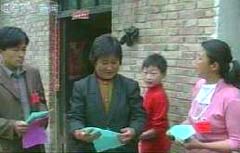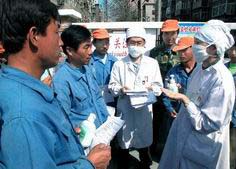 As the SARS epidemic spreads through many Chinese cities, great efforts are being made to prevent its outbreak in the more vulnerable rural areas. As the SARS epidemic spreads through many Chinese cities, great efforts are being made to prevent its outbreak in the more vulnerable rural areas.
From the moment the all-out campaign against SARS began in China, the Chinese government attached great importance to the prevention of a SARS outbreak in the vast rural areas. An integrated system of medical care, observation and treatment has been set up to effectively reduce the possibility of SARS infections in the countryside. Emergency measures have also been reinforced to contain the spread of the deadly epidemic.
Careful precautionary measures are being taken to help farmers stay free of the deadly epidemic. According to official statistics, these have so far been effective in preventing a terrible outbreak of SARS in rural areas. However, greater coordination is needed, both from the government and the mass of farmers for the common goal of keeping SARS at bay.
On the road to Daxing district on the southern outskirts of Beijing, minibuses can be seen shuttling through the local towns and villages. Special medical teams are on missions to visit and to offer treatment to the farmers. Their goal is to keep SARS out of the rural area.
“Every town in our district is equipped with at least one minibus for treating people with high fevers. There are 18 minibuses in the whole of our district. Given the current all-round task of SARS prevention and control as well as the actual situation in Daxing district, we set up the emergency measure of mobile doctors visits. The aim is to identify and check any people suffering from a high fever at an early stage,” said Jiao Xin, head of the Community Health Care Management Center in Daxing district.
As a precautionary preventative measure, local clinics now treat patients in their homes. Liu Xuening, a 10-year-old girl living in Donglucheng village was very happy to receive a notice, which announced the end of her home quarantine.
In Weishanzhuang town, a local farmer who had been a migrant worker was known to have a high fever. The local medical workers treated him in time and send medicines to his door.
“We sterilize his home everyday. We are also keeping him under medical observation to check his health and body temperature as part of preventing SARS,” said Ma Xiuying, Epidemic Investigator.
Timely spotting and checking as well as quarantine are common practices in many towns and villages in Daxing district.
“Both our doctors and the minibus are ready around-the-clock. Our mobile phones are also on day and night. We must visit patients within three minutes after receiving the call for help. We get to their homes as quickly as possible,” said Liu Dongyun, doctor of Weishanzhuang Town’s Mobile Medical Team.
“According to my statistics, a total of 25 people are under our medical observation. To categorize them by their diseases, five people had pneumonia, 13 had infections of the upper respiratory tract, one had bacillary dysentery, and the other six have purulent tonsillitis. Given the current circumstances, if they still get around, they are very likely to be infected with SARS. Our observation of them at home decreases or even averts the possibility of infection,” said Wang Zhaoxiong, vice president of the Huangcun Town Clinic.
In many towns and villages, everyone, from children to the elderly, is playing the role of a supervisor for each other in finding people who show signs of high fever.
 “All our villagers have been mobilized to supervise each other. If a person with a high fever is found, he or she will be reported to me immediately,” said Peng Wenju, chairman of the Bocun Village Council in Huangcun Town.
“All our villagers have been mobilized to supervise each other. If a person with a high fever is found, he or she will be reported to me immediately,” said Peng Wenju, chairman of the Bocun Village Council in Huangcun Town.
During the anti-SARS campaign in the rural areas, the community health service station is playing a very important role. A network of such stations was also set up to effectively block the outbreak of SARS.
“We’ve set up 148 community health service stations like this in our district. The standard is to set up one for every 3,000 to 5,000 farmers,” said Jiao Xin.
As the village branch of the local hospitals, each community health service station creates health files for all the farmers in its precinct. So a timely visit to the patient and effective treatment can be guaranteed. Also, the local farmers are only charged for basic medicines. They appreciate this kind of medical care a great deal.
“I just make a call and they’ll come to give me a transfusion. I’m glad that my health condition is improving,” said the patient.
“The rural areas are the biggest concern of the governments at different levels during these anti-SARS endeavors. Because the medical resources of the rural areas are the weakest. And farmers have very little awareness about SARS prevention. Once SARS break out here, it will be more difficult to control than in the cities. From the perspective of medical care, the network and medical staff should take their duties seriously. We’ve pushed the treatment battlefront to the doors of high-fever patients. The aim is to decrease cross infection during treatment and transportation,” said Yu Luming, head of the Health Bureau in Daxing district.
“The volume of our out-calls is quite large. The average is four to five times per day. All the patients receiving our treatment at home are elderly people or those who are too weak to walk out,” said Zhang Yinhua, doctor of the Community Health Service Station.
To some degree, the unexpected strike of SARS disturbed the normal lives of the mass of farmers, but it also brought some good changes. They now pay more attention to hygiene around them and are taking some measures to get rid of some habits.
“In the past, a feature of rural areas has been independence of each family. Thus the storage of rubbish didn’t conform to proper standards. They just dig a pit in front of their house, causing the breeding of flies and mosquitos. Now, on the order from the higher authorities, we’re preparing to replace all these with closed garbage cans,” said the party secretary of Bocun Village.
Apart from the reinforcement of various cleaning measures inside towns and villages, strict regulations are also carried out for the entry of people and vehicles from outside. Disinfection is essential to arrest any imported threat of SARS.
|